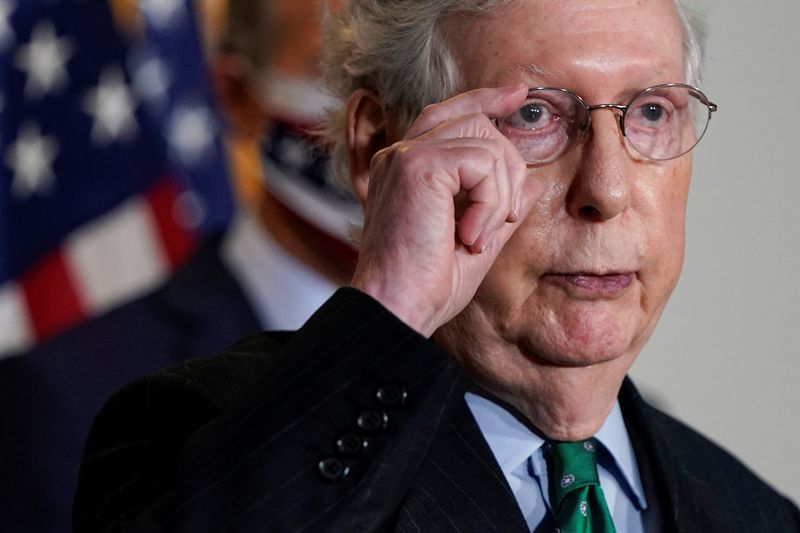By David Morgan
WASHINGTON (Reuters) - President Donald Trump's response to his COVID-19 diagnosis, including his shock move to upend talks with Congress on shoring up a pandemic-hit economy, has fellow Republicans fearing they might lose their U.S. Senate majority in next month's election.
Republicans hold a 53-47 majority in the Senate and with competitive races for 10 seats, including eight held by Republicans, the party had hoped to focus on confirming Trump's third Supreme Court nominee and cementing a 6-3 conservative court majority that could endure for decades.
Instead, Trump's diagnosis and his ongoing dismissal of the risks of the disease have put the spotlight once again on a health crisis that has killed more than 210,000 people in the United States, more than in any other country.
Trump's disclosure on Friday that he had the coronavirus was "the nail in the coffin; it’s all over" for the party's hopes of defending its majority, said a senior Senate Republican aide - particularly when Trump persisted with his misrepresentation of the risks.
"The prospect of a high-seat loss is there," the aide said. In a reference to Joe Biden, Trump's Democratic rival in the Nov. 3 vote, the aide added: "I think it could be as much as nine or 10 if Biden wins big, which I think he may."
Reuters/Ipsos opinion polls this week showed Democratic challengers leading in Arizona, North Carolina, all battleground states that decide who wins. Three major nonpartisan election analysts added Trump ally Senator Lindsey Graham (NYSE:GHM) of South Carolina to the list of vulnerable Republicans.
'FACING COVID HEAD-ON'
Trump campaign spokesman Tim Murtaugh defended Trump's coronavirus response.
"The president has been clear. People should be careful and take precautions, but we cannot allow the virus to dictate a complete shutdown of our society," Murtaugh said. "He is facing COVID head on, just as he has been fighting for the country the last four years."
Trump appeared in a video on Twitter late on Wednesday boasting that catching COVID-19 was a "gift from God" because it gave him insight into treatments. But the White House has offered little detailed information on his condition or the toll the disease had taken on his lungs.
"If the president goes back in the hospital, if there are complications, it could be a very volatile time," said Republican strategist Ron Bonjean, who is close to the White House and Senate Republicans.
Trump spooked Wall Street by torpedoing talks for a fresh round of coronavirus stimulus, tarnishing a metric that he and fellow Republicans had meant to hold up as a sign of success.
"Republicans are strongest talking about the pandemic in economic terms ... that's a winner," said a Republican strategist who is working in several key Senate races.
"Nothing about the events of the last week or so have pointed the conversation in that direction. We're talking again about the health aspects of the pandemic and it's not viewed as a helpful conversation for Republicans," the strategist said.
VULNERABLE REPUBLICANS
The coronavirus, which has infected more than 7.5 million people in the United States, is on the rise in 25 U.S. states, including several where Republican incumbents face competitive races: Alaska, Iowa, Montana, North Carolina and South Carolina.
The spotlight on COVID-19 could be most dangerous for vulnerable Republican incumbents known for their allegiance to Trump, including Graham, Martha McSally of Arizona, Joni Ernst of Iowa and Thom Tillis of North Carolina. Tillis also tested positive for COVID-19.
"This is super unhelpful to candidates. There's really no way around that," said an official with a Republican Senate campaign.
Their best chance to turn the debate away from the coronavirus will come on Monday, when the Senate Judiciary Committee begins confirmation hearings for Trump's Supreme Court choice, conservative Judge Amy Coney Barrett.
That was the response of Republican Senate Majority Leader Mitch McConnell, who on Tuesday said he supported Trump's move to break off coronavirus stimulus talks.
"We need to concentrate on what's achievable," McConnell said, alluding to next week's confirmation hearings.
The Supreme Court's importance on key Republican issues, from abortion to gun rights to taxation, could help flagging candidates shore up support among their own base and even win independent voters, strategists said.

A Morning Consult/Politico poll released on Wednesday showed that 46 percent of voters favor Barrett's confirmation, up 9 points since her nomination was announced.